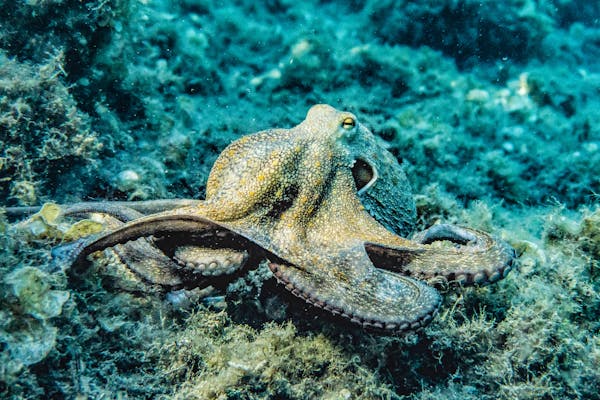Decoding the Mysterious Lives of Octopuses: The Intelligent Invertebrates
**Introduction** Delve into the captivating world of octopuses—marine creatures renowned for their intelligence, adaptability, and fascinating behaviours. This article unravels the mystery that surrounds these cephalopods, from their evolutionary journey to their cognitive abilities, providing a fresh perspective on these enigmatic invertebrates.

A Voyage Through Time: The Evolutionary Journey of Octopuses
Octopuses, belonging to the class Cephalopoda, have a fascinating evolutionary history. They evolved from a common, mollusk-like ancestor around 500 million years ago. Over time, they developed unique adaptations like jet propulsion, ink production, and highly developed vision. The octopus’s evolution showcases an intriguing interplay of genetic mutations and environmental pressures leading to one of the most intelligent invertebrates on the planet.
The Eight-Armed Marvel: Understanding Octopus Anatomy
Octopuses are distinguished by their eight arms lined with suckers, bulbous head, and a soft body that can squeeze into tight spaces. One of the most remarkable anatomical features of octopuses is their three hearts, two of which pump blood to the gills, and one circulates it to the rest of the body. When an octopus swims, the heart that delivers blood to the body stops beating, explaining their preference for crawling over swimming.
Master of Camouflage: The Octopus’s Survival Strategy
Octopuses are famous for their ability to change colour and texture rapidly. This incredible skill is used for communication and, more importantly, for camouflage to evade predators and ambush prey. This ability is due to specialised cells in their skin called chromatophores, iridophores, and leucophores. The coordination of these cells enables an octopus to mimic complex patterns and even imitate other species.
Cognitive Giants of the Sea: Octopus Intelligence
The intelligence of octopuses is a hot topic in scientific circles. They have exhibited problem-solving skills, short- and long-term memory, and even play behaviour. Some octopuses have been observed using tools, a trait usually attributed to higher mammals and some birds. Recent research points to the octopus’s large brain and a high number of neurons as key factors contributing to their cognitive abilities.
Octopuses in Popular Culture and Conservation Efforts
Octopuses have long been subjects of fascination and inspiration in popular culture, from maritime folklore to modern film. They are often depicted as sea monsters or intelligent aliens due to their foreign appearance and behaviours. Conservation efforts for octopuses are gaining attention due to concerns about overfishing and habitat destruction. Organisations like the Marine Conservation Institute are advocating for the protection of octopus habitats to ensure their survival.
Conclusion
The octopus, with its intelligence, adaptability, and intriguing biology, continues to captivate the human imagination. As we continue to unravel the mysteries of these remarkable creatures, we are reminded of the diversity and complexity of life on our planet. Ensuring the survival of these intelligent invertebrates is a testament to our commitment to preserving the world’s biodiversity.




